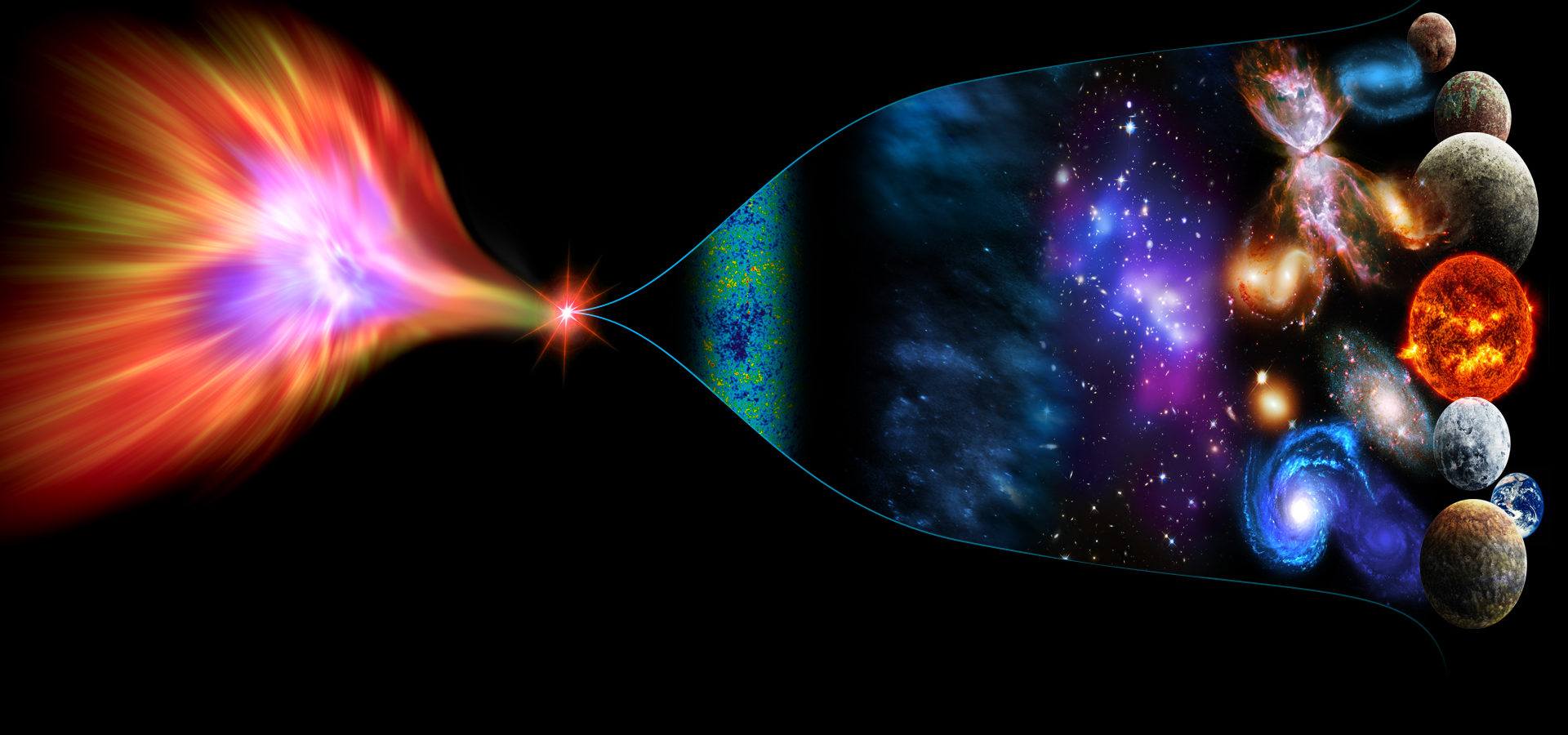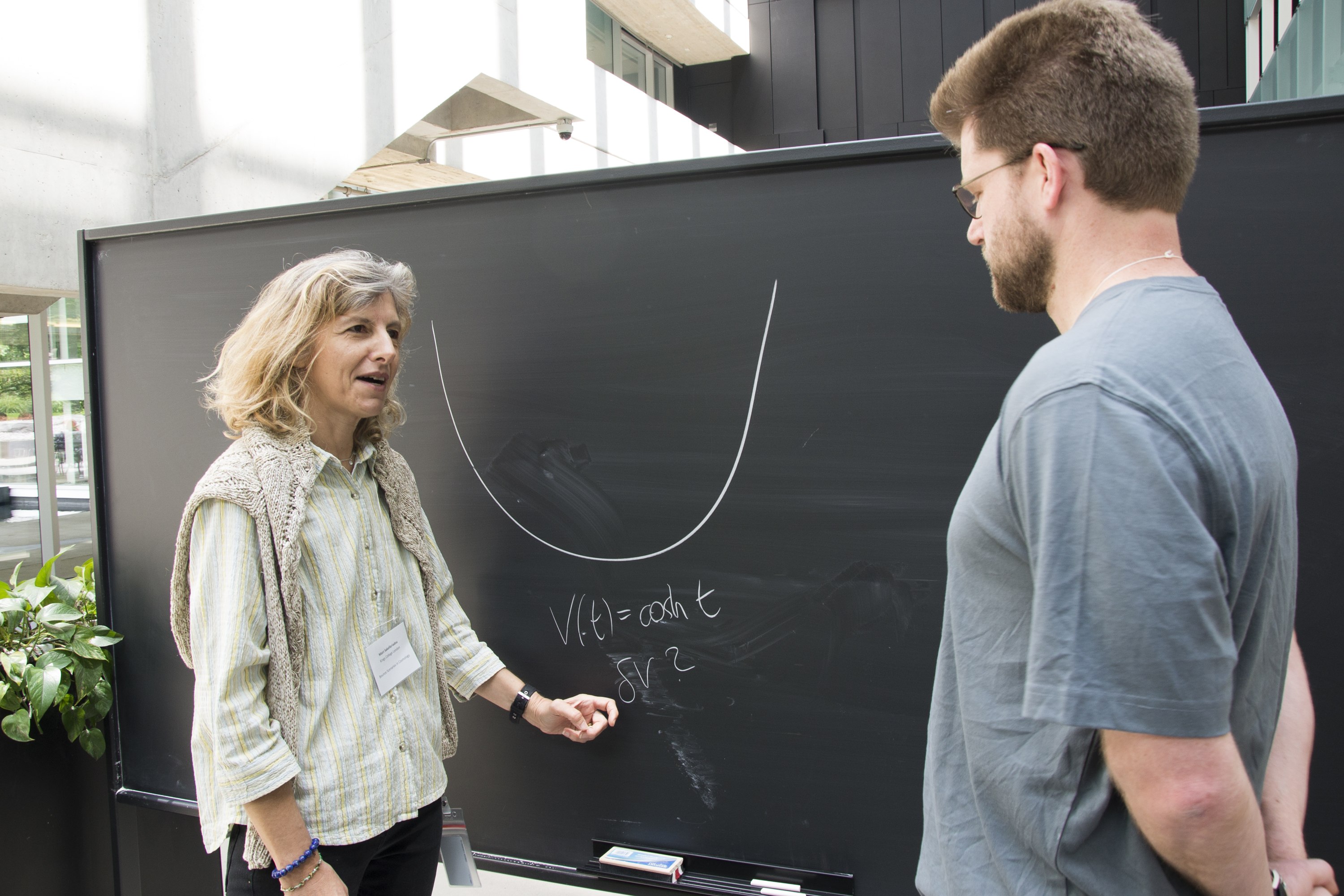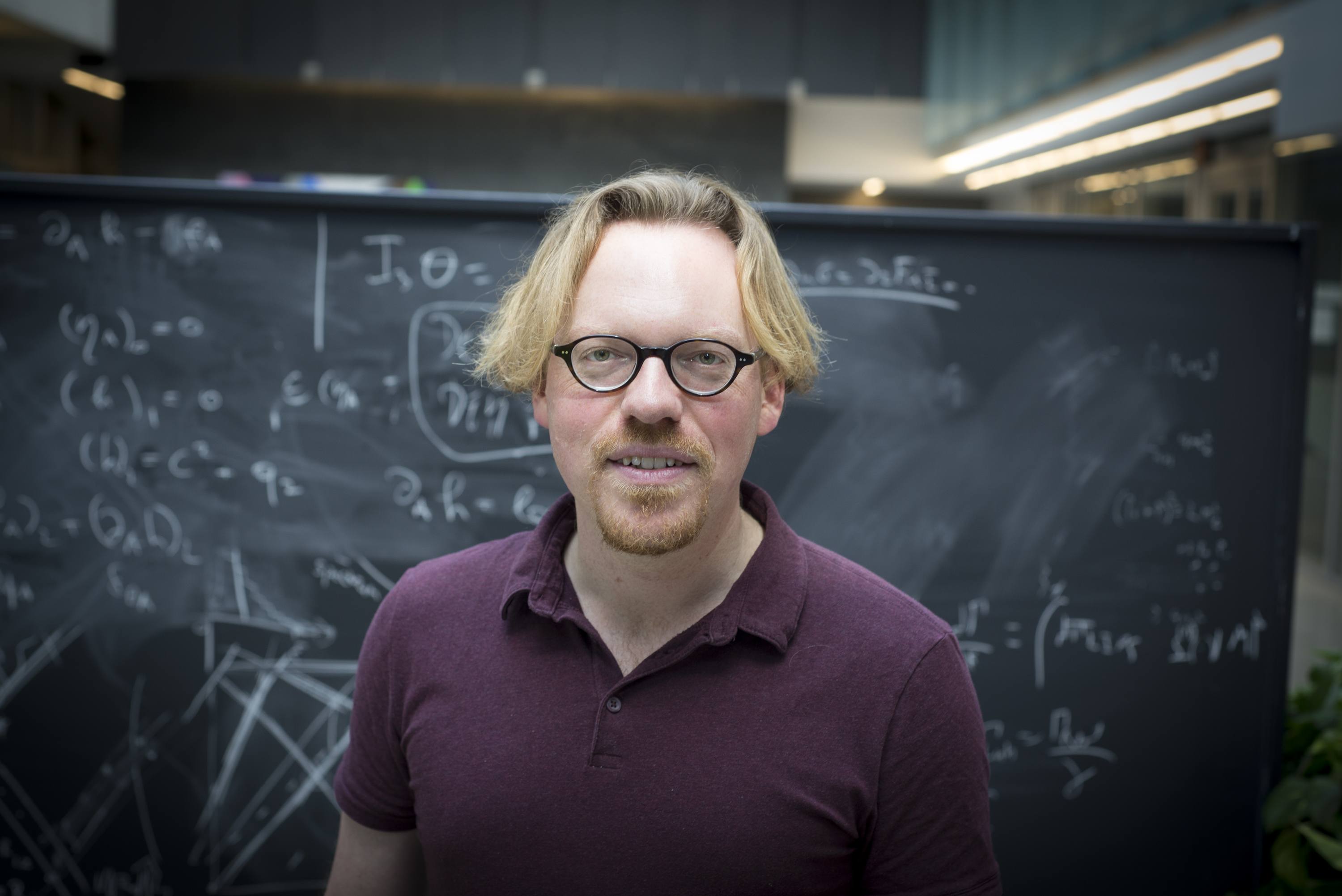Comparing cosmologies: theorists debate the “big bounce”
Dozens of theorists gathered at a recent conference at Perimeter Institute to probe one of humanity’s oldest questions: how did this all begin?
Take a self-guided tour from quantum to cosmos!
Dozens of theorists gathered at a recent conference at Perimeter Institute to probe one of humanity’s oldest questions: how did this all begin?

In standard cosmology, the universe starts with a big bang. An emerging idea replaces the bang with a “bounce” between a shrinking former universe and our expanding one. A recent workshop at Perimeter Institute brought together proponents of various “bounce scenarios” to compare approaches, discuss broad concepts, and to ponder the role of quantum mechanics in the universe’s first moments.
Inside the Perimeter took the opportunity to dig a little deeper, and asked four workshop participants for their perspectives. Below are thoughts from Abhay Ashtekar from Pennsylvania State University, Martin Bojowald from Pennsylvania State University, Jean-Luc Lehners from the Albert Einstein Institute, and Mairi Sakellariadou from King’s College London.
Inside the Perimeter: What do you see is the greatest weakness in the big bang theory?
Jean-Luc Lehners: The greatest weakness, and at the same time the greatest opportunity, is the big bang itself. At the big bang, the model breaks down, as physical quantities such as the density and the curvature of space and time become infinite. This means that we cannot trust the equations anymore, and a better model is needed. Bringing quantum theory and gravitational physics together in order to address this challenge is seen by many, including myself, as the most interesting problem in theoretical physics.
Mairi Sakellariadou: The big bang theory is formulated within the framework of Einstein’s classical theory of general relativity, which is not adequate to explain the earliest stages of cosmic existence, and cannot provide an explanation for the big bang itself. Quantum mechanics must have played a role at sufficiently early times.
Martin Bojowald: If one uses classical general relativity, there is a big bang singularity preceding the expansion of the universe. This poses a conceptual problem because it stands in the way of a proper analysis of the initial state of expansion.
Abhay Ashtekar: To me, the biggest weakness is that it’s a prediction of a theory beyond its domain of applicability. In any physical theory, if you try to push it beyond its domain of validity, it gives nonsensical answers. Usually when this happens, then one doesn’t take that theory very seriously in that domain. That is its limit. General relativity predicted singularities, in particular the big bang as the most spectacular of them, but for some reason, people take it seriously. The big bang singularity, black hole singularities, these are windows to discovering physics beyond Einstein.

Inside: What is meant by the term “bounce scenarios”?
Lehners: Bounce scenarios try to replace the big bang by a transition from an earlier phase of evolution of the universe. That means that the big bang is not seen as the beginning, but only as a transition point, typically from a phase of contraction into a phase of expansion.
Sakellariadou: Bounce scenarios are cosmological models, inspired by different approaches to quantum gravity, where the classical big bang singularity is replaced by a bounce, often followed by a phase of inflation. The energy density has a maximum at the bounce, where the volume reaches its minimum, but non-zero, value.
Ashtekar: The bounce scenario, for me, is a scenario in which one is going beyond Einstein, beyond general relativity, thereby avoiding the big bang, and replacing the big bang with something where physics does not break down. To me, that really involves some quantum mechanical aspects.
Inside: Which paradigm for the early universe do you think shows strongest potential? Why?
Lehners: This is very hard to say at present. I have become skeptical of essentially all current approaches, mainly because I have the feeling that we are putting much more into the models than we are getting out of them. By this I mean that the present conditions of the universe do not come out naturally in any of the current models, and as we learn more about the early universe we have to adjust the models again and again. It may well turn out that the current models contain elements that will become incorporated into future models. But many of the big questions remain unanswered at the moment. Hence I keep my mind open for new directions to explore.
Bojowald: The inflationary paradigm, because it is the closest to observational tests. Anything that could have happened before inflation remains poorly controlled.
Sakellariadou: At this point, I do not believe that there is enough evidence to favour a particular scenario. Different quantum gravity proposals offer appropriate frameworks to build cosmological models. We are still at the stage of extracting their distinct predictions and confronting them with currently available data, while also trying to better understand their conceptual underpinning.
Ashtekar: The big bang is replaced by something. What? You want to derive it from some principles. The reason I’m looking at it from loop quantum cosmology, and I prefer this versus some other approaches, is that there is actually a paradigm which is much broader – a paradigm rooted in all of quantum gravity, that is, loop quantum gravity – which is being applied to the system of cosmology.

Inside: What observational evidence (if any) could be sought in support of your preferred bounce theory?
Ashtekar: There is a window open now to perhaps look for these quantum gravity effects in the cosmic microwave background at the largest scales. This is the only concrete example I know that is available directly in the future, where one could have an interface between observations and fundamental theory.
Lehners: It is, unfortunately, currently impossible to directly test any of the theories of the early universe. Our earliest observations come from the cosmic microwave background radiation, which was emitted 380,000 years after the big bang. Thus a big extrapolation back in time must be undertaken. Hopefully we will one day be able to look further into the past, perhaps with gravitational waves. But this might take time. That said, the fact that a theory must be consistent with what is seen in the cosmic background radiation is nevertheless a highly non-trivial check, which already filters out many models.
Sakellariadou: Currently we have a variety of precise observational and experimental data, either from astrophysics or from particle physics. The predictions of cosmological models must be confronted against such data. For instance, if primordial gravitational waves are observed, certain bounce cosmologies will be in trouble.
Inside: Why is it important to come together in a forum like this to discuss these ideas?
Bojowald: The question of what might replace the big bang singularity requires us to handle quantum spacetime at very high densities. There is no reliable intuition that could guide us. It is a complicated problem in which promising ideas have often encountered unexpected obstacles. It is good to see how other approaches have dealt with such issues, or what additional difficulties they might suggest.
Lehners: It is important because discussions with other people often significantly speed up progress. If you try to explain your ideas to others, it quickly becomes apparent what is well understood and what aspects need more work. Also, interactions lead to new ideas. Despite phones, email, and video calls, I still find personal interactions to be by far the most productive.
Dark Matter Night will feature live talks on October 26 at both Perimeter Institute and the McDonald Institute, webcast free online.
Nicole Yunger Halpern elaborates on a tribute to her former Perimeter Scholars International classmate woven within her new book.
In his April 7 webcast, cosmologist Will Percival will use recent galaxy survey results to explore the vastness of space.